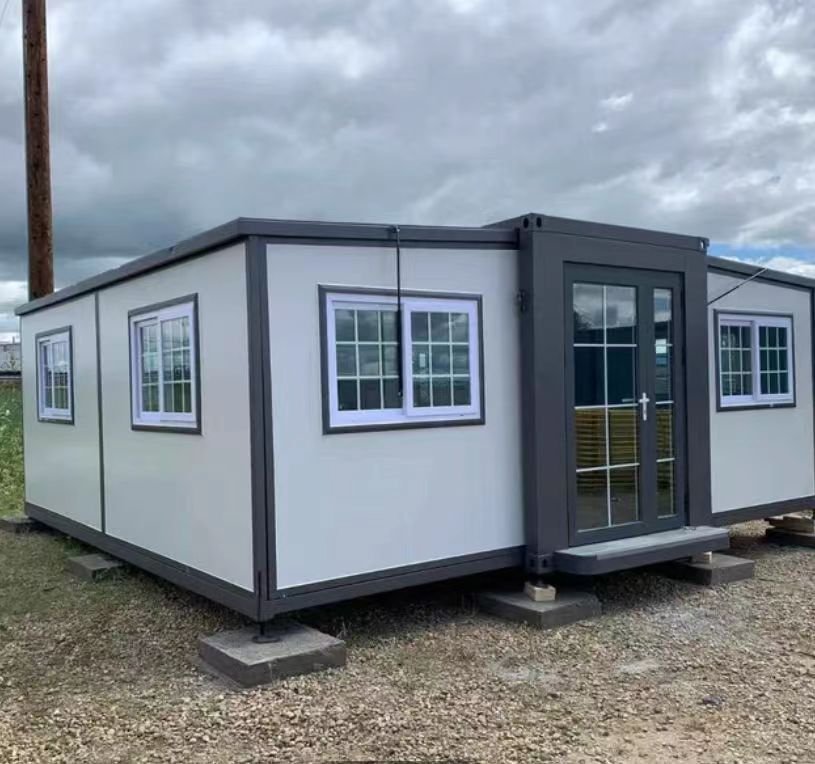Does Your Container Home Retain its Worth?
Imagine investing in a home constructed out of shipping containers. It’s smart, chic, and most importantly, a statement in sustainability. Nevertheless, you have this lingering voice in the back of your head.
“Will this place maintain its worth down the line?”
Many people considering container homes feel the same way. We all want to know that our contributions pay off, especially if we’re entertaining something unconventional like container living.
It’s only natural to wonder. After all, compared to traditional brick-and-mortar homes, container homes are a newer landscape. It’s the road less traveled, but it’s picking up. We need to know if they hold value. Stick with us as we address those doubts and take a closer look at what makes a container home valuable in the long run.

What Happens to the Value of Your Container Home?
The Manufacturer's Perspective
As a maker of modular container homes, we have witnessed the evolution of container homes from a niche experiment into a mainstream housing solution. From the deserts of the Middle East to bustling Southeast Asian cities, our container homes have found diverse landscapes—both physical and economic—and continue to retain their value over time. In this article, I’ll share insights based on years of experience and data about container homes—how they are built, marketed, and appraised—to help you make an informed decision.
Do container homes hold value? The answer is not a simple yes or no, but rather, it depends on a number of critical factors—location, quality of construction, market trends, investment potential, and more. Let's delve into each one.
Container homes, yes, they hold value.
- Location The location of a container home plays a crucial role in its value retention. Properties situated in desirable areas—especially those with high demand for affordable and sustainable housing—are more likely to appreciate over time. Locations with good infrastructure, natural amenities, or high tourism potential often boost the value of container homes. Conversely, homes built in remote or less desirable areas may struggle to maintain their value.
- Quality of Construction The quality of the conversion from shipping container to livable space is another key determinant of long-term value. High-quality builds that adhere to strict building codes—incorporating well-done insulation, structural reinforcement, and aesthetically pleasing interiors—tend to retain value more effectively. On the other hand, homes with poor construction practices, inadequate waterproofing, or subpar insulation may face depreciation faster. Issues like moisture infiltration can harm a container home's marketability and resale value.
- Market Trends The value of container homes is also influenced by the overall real estate market and consumer preferences. As the interest in affordable and sustainable housing continues to grow, container homes are becoming more popular. This trend is supported by data: the global container home market is projected to exceed $73 billion by 2026. Market acceptance of container homes has been steadily increasing, and this expanded interest positively impacts their value. Rising environmental consciousness among homebuyers also supports the value proposition of container homes.
- Investment Potential Shipping container homes can be a sound investment, provided the conditions are right. With lower initial costs compared to traditional homes—ranging between $40,000 and $60,000—they offer an attractive return on investment (ROI) that can range from 25% to 35%. Container homes are also a profitable option for rental income, especially in areas where travelers and tourists seek unique and affordable accommodations.
- Resale Value The average resale value of container homes is approximately $75,000, but some homes can sell for much higher depending on their design, features, and location. Proper maintenance, quality amenities, and attention to interior design and landscaping can also add value, making container homes appealing to prospective buyers and investors.
Why You Need to Know More about Container Homes?
The fact that container homes can retain or possibly increase their value over time if they’re built well, located strategically, and quality-built is only part of the equation. To understand whether container homes are the right fit for you as a buyer, you need to answer more nuanced questions regarding issues like location, durability versus traditional homes, and potential setbacks.
Over the next sections, we’ll discuss key aspects that affect the value of container homes and guide you in making sound decisions if you’re evaluating this unique housing option.
What Are the Biggest Factors that Impact the Resale Value of Container Homes?
There are a number of factors that can impact how much container homes can bring on the open market. These elements are critical for those who are looking to buy and invest in a container home.
- Location, Location, Location: Of course, the old adage that location in real estate is everything is true and holds for container homes as well. Having a container home in a locale that has a high demand for housing, has access to local amenities, or is near tourist destinations is going to make the resale value of your pad that much greater. Conversely, if your home is in a secluded area that is hard to get to, you might have more challenging resell.
- Curb Appeal and Customization: Having a thoughtfully designed home is a game changer. Buyers are going to be drawn to a home that has a unique floor plan, efficient use of space, and classy finishes. Incorporating lots of natural light, open floor plans, and cutting-edge furnishing can greatly add to the resale value of the home.
- Structural Soundness and Durability: The quality of insulation, flooring, and reinforcement from the construction of the home will affect its value over time. Using materials to protect against rust and insulation capable of handling extreme weather conditions make all the difference in protecting your investment and preserving the resale value.
Are Container Homes More Durable Than Traditional Homes?
When it comes to durability, container homes indisputably have some unique perks. Shipping containers are built to withstand tough conditions out at sea—making them naturally weather-resistant, particularly to heavy rain or hurricanes. This is a huge benefit for places with notoriously harsh weather.
That’s not to say that they don’t have limitations. If container homes aren’t properly insulated and sealed, they could experience condensation, corrosion, or rust, especially in damp climates. To ensure durability, you must properly insulate the structure and treat the surface against rust. They may require a little more work to make sure they’re warm enough in distant climates compared to traditional homes, but with proper preparation, they can outshine typical homes in harsh weather.
What Are the Potential Risks of Investing in Container Homes?
Every investment has its risks, and container homes are no different:
- Regulation Hurdles: Not every region has a clear set of building codes or regulations regarding container homes. This can sometimes make obtaining permits and certifications challenging, depending on local regulations.
- Customization and Costs: While container homes are cost-effective in many cases, significant customization can add up. Features like solar panels, modern kitchen appliances, and aesthetic enhancements can push costs closer to those of traditional homes, affecting the cost-benefit equation.
- Insulation Challenges: Containers are made of steel, which is a poor insulator. Without adequate insulation, they can be unsuitable for extreme hot or cold climates. Ensuring proper insulation increases initial construction costs.
How Fast Can You Construct a Container Home and Move in?
The standout benefit of container homes is they can be built FAST. While traditional homes can take a year or more to build, you can finish a container home in weeks. A standard container home with basic features can be built in 6 to 8 weeks. If you’re doing a more intricate project with custom floor plans and features, expect it to take 3 to 4 months from start to end. This makes them fantastic for folks who need to get a home up and running fast—for, say, vacation rentals, remote work sites, or as emergency shelters.
Are Container Homes Worth It?
Container homes can be a great investment and even appreciate in value.
Things like sound construction practices, strategic location, cool design, and favorable market conditions all play a role in how they perform over time. While there are specific challenges with container homes—like insulating them and dealing with possible regulatory hiccups—you also benefit from things like rapidly building them, their sustainability and having an opportunity to tap into new investment possibilities.
If you’re thinking about jumping into the world of container homes, we encourage you to do your due diligence. Plan things out ahead of time, and work with a good builder who understands all the nuances that come with building out of shipping containers. With some thinking and a lot of creativity, container homes can be a pretty darn good investment choice for you.




